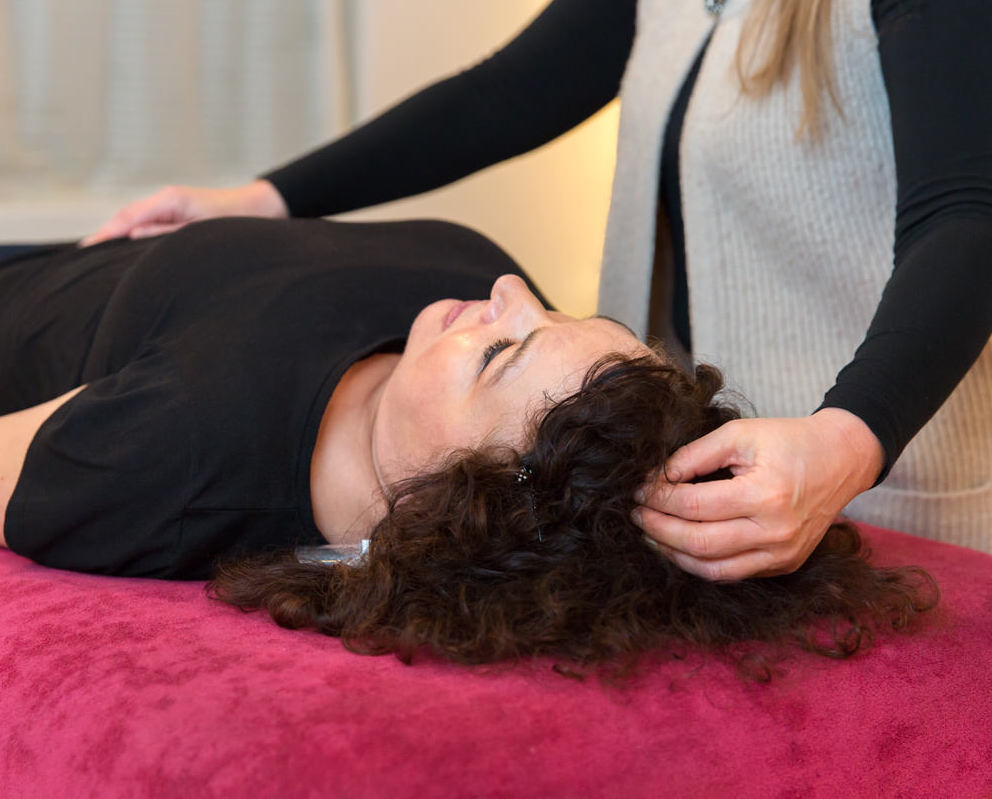Kinesiology
Kinesiology means ‘study of movement’. It uses gentle manual muscle testing to identify where imbalances are occurring within the body.
Ancient teachings and beliefs suggest that if our Qi (our life force, or energy) is blocked, then stress and illness presents itself. Kinesiology works holistically to find the root cause of energetic imbalance and help the body heal from within. It aims to rebalance your system towards optimal health and wellbeing.
How did Kinesiology develop?
Kinesiology as we know it today has been around for more than 60 years.
An American chiropractor Dr Goodheart identified that by massaging the beginnings and ends of a muscle he could increase its strength. He taught this technique to chiropractors, osteopaths and doctors.
Over time, in also working with Chinese medical theory, they discovered links between muscle response, meridian energy and related organs. Dr Goodheart became famous for being able to solve problems that no-one else could.
Kinesiology has been in the UK since 1988. This was when The Association of Systematic Kinesiology (TASK) was founded by Brian Butler, following his training in the US under the International College of Applied Kinesiology (ICAK).
How does Kinesiology work?
Based on biofeedback from the muscle test, your Kinesiologist can identify what is going on in your body and devise a plan. You may also be given advice on foods, nutritional supplements, relaxation and other techniques, lifestyle changes and more. All of this aims to support you to come into better balance and achieve your optimum health and well-being.
Kinesiology incorporates lots of the bodywork techniques you might see in many other holistic therapies, for example, working with the meridians and chakra points (energy pathways across the body). This is all to clear trapped energy and help you to re-establish your mind-body connection.
What does a session involve?
During the first session, your Kinesiologist will take a full medical and lifestyle history. With your consent, they will work with you to identify and address your specific concerns and areas causing stress. This is why you need to allow up to 1 hour 15 minutes for your first appointment.
Kinesiology does not work on diagnosis, but looks at what symptoms are showing at that particular moment and how they are impeding you from functioning well.
In this and follow-up sessions, your Kinesiologist will use gentle manual muscle-response testing to identify imbalances which may be contributing to your loss of health and well-being. This will then show them ways to help restore balance. To do this, they will ask you to place your arms, legs or head into specific positions and then apply a light pressure against the muscle that is being tested.
Your session may also involve other techniques, such as acupressure, movement, breathwork, visualisation, and nutritional supplements or flower essences all to help rebalance and support your body.
What physical and emotional issues can Kinesiology help with?
Kinesiology addresses the whole body and can be used to help address lots of stress in the body resulting in physical and emotional issues. These include:
- Stress and Anxiety
- Fatigue
- Digestion Issues (loose stool, constipation, flatulence, indigestion, IBS, abdominal pain)
- Ongoing Aches and Pains (neck, shoulder, back, hips, knees, ankles)
- Headaches and Migraines
- Sinus Issues
- Skin Problems
- Bladder or Kidney Conditions
- Candida
- Chest Infections
- Asthma
- Food Sensitivities
- Thyroid Issues
- Hormone Difficulties
- Emotional Stress
- Trauma
- Chronic Illnesses.
What will I need to wear?
You are advised to wear loose and comfortable clothing and minimal jewellery. You are fully clothed for your session – Kinesiology is non-invasive and no needles are involved.
How many sessions will I need?
There isn’t a set number of recommended sessions. But most clients come for three to five sessions and then top up when needed. Some come regularly (every four to six weeks) to maintain their balance.
We recommend a four to six weeks gap between each session.
Are there any misconceptions?
People are often surprised about how Kinesiology works. It is generally accepted that quantum physics predicts very strange things about how matter of energy works that are completely at odds with how things seem to work in the real world, and this is how Kinesiology would seem to work too.
Having a Kinesiology session is rather like having an MOT for your body and mind. Once you’re open to it, the results can sometimes be life-changing.
How much does it cost?
- Initial consultation: £99 for 1 hour 15 minutes
- Follow ups: £77 for 45 minutes (£55 for children younger than 16)
- Free 30 minutes discovery call
(Any nutritional supplements recommended are not included in treatment costs.)



